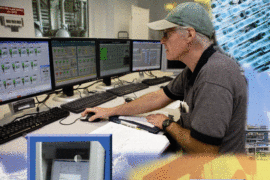
Further investment in the AI/ML technologies means for Modcon adopting sustainable business strategies and developing innovative advanced products
LONDON, UNITED KINGDOM, November 19, 2021 /EINPresswire.com/ — There is a total of 17 Sustainable Development goals, as defined by the United Nations, that can be grouped under three pillars: Environment, Economy and Society. Artificial Intelligence (AI) and Machine Learning (ML) plays an important role in achieving these goals – from sustainable production, pollution control and water efficiency to industrial safety, clean air and healthcare.
Sustainable development is frequently defined as development that meets the needs of present generations without compromising the ability of future generations to meet their own needs. As evidence of the harm to health and well-being from widespread environmental degradation and global climate change grows, communities and governments are placing greater emphasis on assuring that economic development is achieved in a sustainable way.
Modcon Systems is the multidisciplinary innovative company with own technologies of process analysis, control and optimization for the process industries. Modcon was founded in 1972 and has almost 50 years’ experience in process analysis, control and optimization for production of high value and on-specification products at optimal cost and minimal environmental burden.
Just like internet companies that can create high value by optimizing the commercial assets in the consumer market by data analytics, Modcon AI/ML solutions generates high value by optimizing the assets from process real-time analytics and processes data they have acquired from the operations and productions. Modcon AI/ML technologies enables simply interacting with the process and incrementally improving control behavior.
The purpose of Modcon-AI package is to provide process engineers with set of modern optimization tools, which enables connectivity, validation and prediction of main KPIs, to take the correct decisions to maintain and improve effective industrial processes management. The implemented in this solution artificial neural network (NN) dynamic models enables to calculate and predict physical properties and chemical compositions for different process streams, and proposes required set points, that will accomplish the calculated predictions.
Reinforcement learning makes use of algorithms that do not rely only on historical data sets, to learn to make a prediction or perform a task. Just like we humans learn using trial and error, these algorithms also do the same. A reinforcement learning agent is given a set of actions that it can apply to its environment to obtain rewards or reach a certain goal. These actions create changes to the state of the agent and the environment. The DRL agent receives rewards based on how its actions bring it closer to its goal.
DRL agents can start by knowing nothing about their environment and selecting random actions. Because reinforcement learning systems figure things out through trial and error, it works best in situations where an action or sequence of events is rapidly established, and feedback is obtained quickly to determine the next course of action — there is no need for reams of historical data for reinforcement learning to crunch through. That makes DRL perfectly suitable for hydrocarbons processing optimization tasks using established metrics in the form of inputs, actions, and rewards. DRL dynamic model is getting real-time data from process analyzers, which is verified and validated against the laboratory results and predicted products quality. The simulated process’ “digital twin” is continuously updated by process analyzers to allow highest possible efficiency of the process at lowest cost. This method enables global process optimization through integration of the network input and target KPIs, using DRL dynamic modelling to
Recently Modcon Systems announced they are forming a separate division to address healthcare’s most challenging quality, equity, and safety problems. The VsScan Analyzer has been specially developed for the rapid and touchless assessment of vital signs as a “first point of contact” to reduce the risk of an infected individual being allowed to enter the general hospital environment, where they could contaminate others.
Further investment in the AI/ML technologies for sustainable development means for Modcon adopting business strategies and developing advanced technologies that meet the needs of the enterprise today while protecting, sustaining and enhancing the human and natural resources that will be needed in the future.






